It’s easy to see why the Hong Kong International Jewellery Show (HKIJS) is promoted as Asia’s biggest spring fair and the world's largest jewellery marketplace.
This year, event organiser Hong Kong Trade Development Council (HKTDC) confirmed that 4,555 exhibitors from 52 countries attended the 35th HKIJS and the fifth International Diamond, Gem and Pearl Show (IDGPS).
Both shows reported record-breaking attendance with 87,000 registered buyers from 145 countries present, a 2 per cent increase from 2017.
Also registered and visiting across both shows were 1,100 Australian trade buyers and 18 exhibiting Australian companies.
Interestingly, since the IDGPS split from the fair in 2014, the HKTDC has seen a 68.4 per cent increase in Australian exhibitors and visitors. HKTDC IDGPS and Jewellery Show chairman of the organising committee Lawrence Ma provided an explanation.
“The total exhibition area expanded to over 123,000 square metres, allowing more local and overseas exhibitors to showcase their offerings,” Ma said.
“The arrangement also enhanced sourcing efficiency for buyers as they could look for jewellery raw materials and finished jewellery in their respective venues under one roof.”
According to Benjamin Chau, deputy executive director of the HKTDC, the overall increases in exhibitor and buyer numbers proved that Hong Kong is an “important sourcing program for the global jewellery industry”.
“With improving global economic conditions, Hong Kong’s exports of precious jewellery rose 3.6 per cent last year,” Chau said. “We are delighted that exhibitor attendance at both shows was the highest in years, and that attendance of both local and overseas buyers set new records.”
Phil Edwards, managing director of Duraflex Group Australia, was one local supplier in attendance who was pleasantly surprised by the optimism in the industry.
“I arrived with low expectations due to the challenging local retail market conditions,” Edwards said. “My immediate impression of the fair was surprisingly positive and much more upbeat, with higher attendance and foot traffic than I expected.
“Whilst I have been told by many international distributors from other countries that retail sales are down, I feel the underlying sentiment from others at the fair was one of optimism and improvement in the coming year ahead,” he added.
However, Edwards also noted that this year’s fair was somewhat lacking in providing new names “with substance”.
“As a local brand distributor, it is a hot topic that there are no specific new brands to launch and share with the local market,” he stated.
Zoning in on tech
New to the fair this year was a designated IT Solutions zone, an area that provided innovative software for the jewellery industry. After all, it is widely acknowledged that mobile, internet and e-commerce developments in the jewellery industry will only increase.
According to Chau, the area also offered inventory management, design, production and e-commerce solutions.
“The IT Solutions zone aimed to help industry players leverage new technologies and applications, and to develop innovative designs and services to enhance competitiveness,” he said.
Ma confirmed the sentiment: “The adoption of technology such as big data analysis and virtual fitting has become a new trend, which is aimed to boost sales and draw more potential buyers.”
The new fair addition was a move that paid off, as PicUp Media founder William Chu attested. Chu is an Australian exhibitor who launched GemLightbox, a lightbox for jewellery, specifically tailored around smartphone photography.
“This new addition shows that the fair organiser has thought about ways to improve and increase other offerings, which will be of interest to buyers,” Chu said.
“We were able to generate a lot of interest and sold out of all GemLightbox floor stock by day two. We are extremely happy with the results and will be exhibiting with them again next year.”
Dominic Hill, founder of cloud platform Atelier Technology, agreed. He noted the new section was far from perfect but “an important first step”, adding, “for years we have been waiting to have our own dedicated space as a community, rather than sitting in the tooling section.”
Chu acknowledged those comments, noting the busy nature of the area: “Buyers are very interested in looking for IT and other technological solutions for their businesses.”
HKTDC also ran a dedicated technology and disruption seminar, covering topics such as blockchain, big data and connecting the jewellery supply chain through cloud technology.
Got ethics? Gen Z & Radical transparency
HKTDC has held events to promote ethical trading since 2014.
Various seminars have targeted ethical practices in the jewellery industry, covering topics such as sustainable tanzanite and gemstone mining, responsible marine-environment practices in coral harvesting and the benefits of responsible sourcing.
This year the fair held a panel discussion in conjunction with the Responsible Jewellery Council (RJC). It highlighted the growing importance for companies to have ethical transparency across all trading practices, from supply to staff.
Jonathan Kendall, senior vice president of De Beers’ diamond brand Forevermark, was one of the panel’s speakers. Kendall said that “radical transparency” in the industry was inevitable.
“Going forward, I don’t think there’s an option,” Kendall told Jeweller. “Consumers are demanding transparency and the internet provides the perfect tool for personal investigative activity. Expectations of transparency are a key aspect of today’s consumer behaviour.”
Edward Johnson, director of business development at the RJC agreed. “Consumers and suppliers are increasingly aware of sustainability and ethics in relation to jewellery, as with many other consumer goods,” Johnson told Jeweller .
“By not addressing these concerns, small businesses risk holding themselves back, making it harder to compete in a world that is increasingly demanding transparency and accountability.”
Ethical transparency is not only important to Millennial consumers; it’s also crucial for the digitally-native Gen Zs.
Also known as the iGen or post-Millennials, researchers generally place their birthing years between the mid-1990s and mid-2000s. With trends coming and going, it’s easy to perceive the demand for ethical transparency as a Gen-Z fad, but Johnson believes this is not the case.
“Transparency is inherently linked to communication and Gen Z are the most-connected generation in history,” he said.
“New ways to source and share information are emerging by the day, and it would be remiss of the industry to dismiss the role of Gen Z in driving the demand for transparency as a ‘fad’.
Gen Z are demanding more from businesses, namely that they take a clear stand on wider social issues and are ethically responsible in their operations.”
As well as ethical transparency, unique designs and multi-channel marketing will be the other two major changes shaping the industry.
Kendall advised small businesses to start adapting to the process slowly. “Understanding your suppliers is the key,” he said.
“Make sure they meet your own ethical standards and challenge them on the key fundamentals: where do they source materials, are they environmentally friendly operations, do they measure their carbon footprint, when will they expect to be carbon neutral, what are their employment policies, is equality part of their business practices, and so on.”
Mined over matter
Synthetic diamonds were also a hot topic at the fair.
Once considered high-cost and impractical, technological changes over the last decade have seen a steady increase in demand for this natural diamond alternative.
“A few years down the road, natural diamonds and lab-grown diamonds will coexist at different price levels,” Ma said. “Lab-grown diamonds will be another product available for the consumers to choose from.”
Edwards agreed with these sentiments; however, he noted that the demand would continue to be a “steep learning curve for trade and consumers”.
“This is a new frontier that I feel will have a huge impact on the market – exactly how much will depend on how they are launched, presented, branded and sold to the consumer,” he added.
When asked if there was room in the market for both synthetic and natural diamonds, Kendall gave a resounding “yes”, and that he sees lab-grown diamonds as “the new cubic zirconia” – they will have a place in custom jewellery, but at a much lower price point.
“The demand for the real thing will be very strong, and the key will be to maintain the emotional differentiation between diamonds and synthetics,” he concluded.
With so many industry developments already underway, it’s easy to see why Asia’s biggest spring fair is so valuable to the Australian jewellery industry.
The next show will be in March 2019.
Angela Han attended the fair courtesy of HKTDC as an accredited media representative.
hong kong jewellery show GALLERY
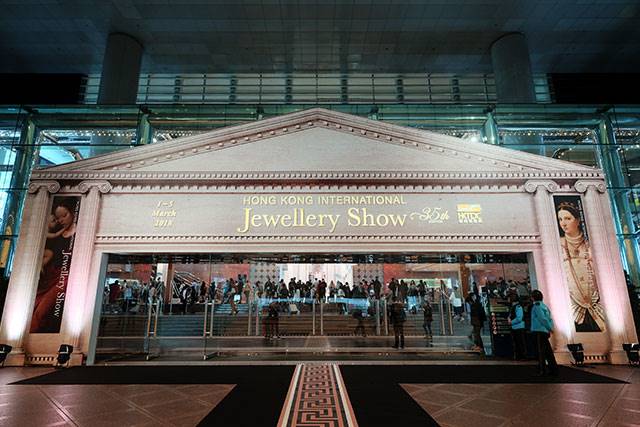
Above: HK Fair Entrance
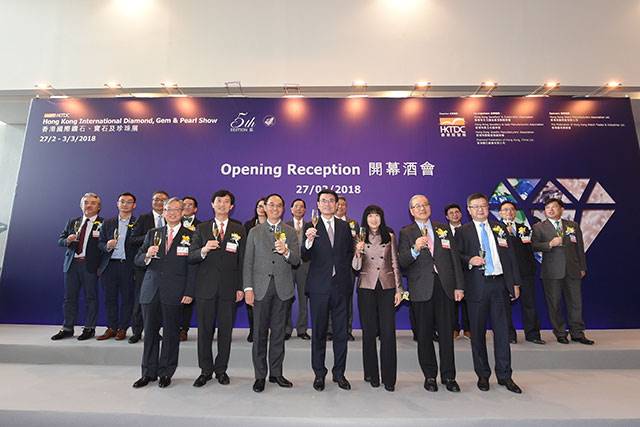
Above: Opening Reception
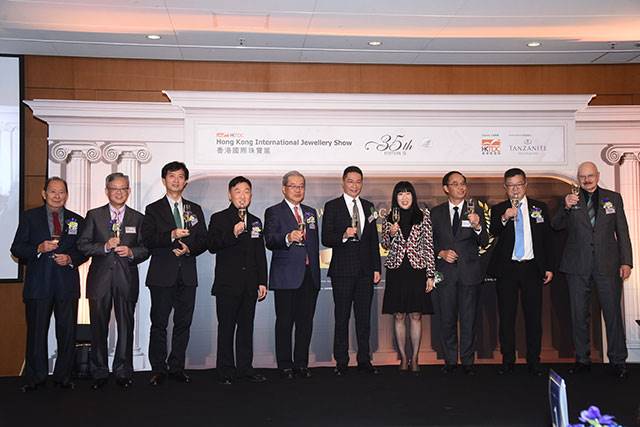
Above: Opening Cocktail Party
 | 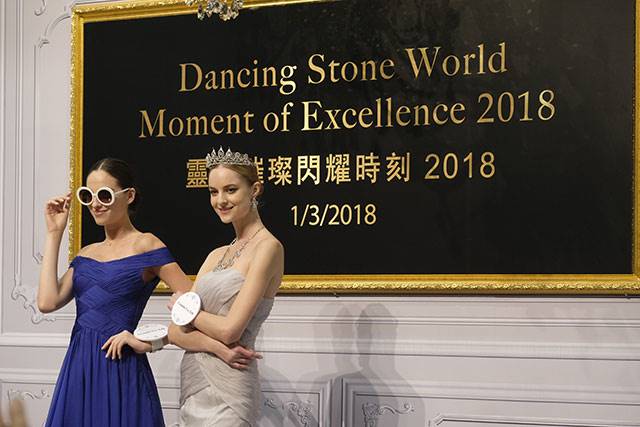 |
Above: Crossfor's Dancing Diamonds cocktail event. | Above: Crossfor's Dancing Diamonds cocktail event. |
 |  |
Above: Crossfor Dancing Diamonds | Above: Crossfor's Dancing Diamonds cocktail event. |
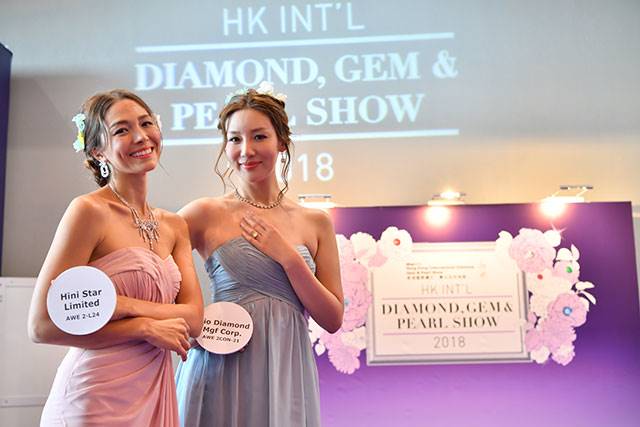
Above: Opening Reception at the Diamond, Gem & Pearl Show.
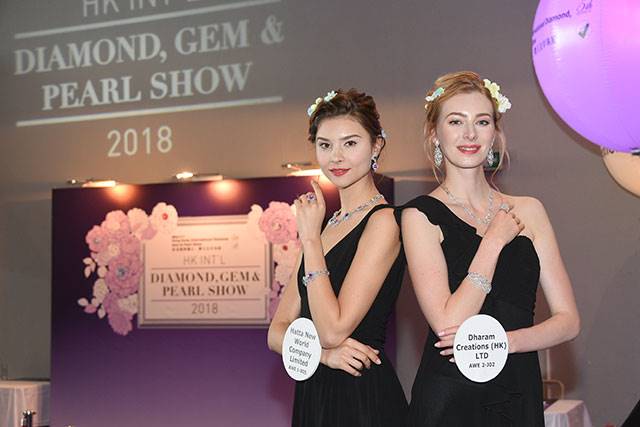
Above: Opening Reception at the Diamond, Gem & Pearl Show.

Above: Models at the Opening Night Gala Dinner
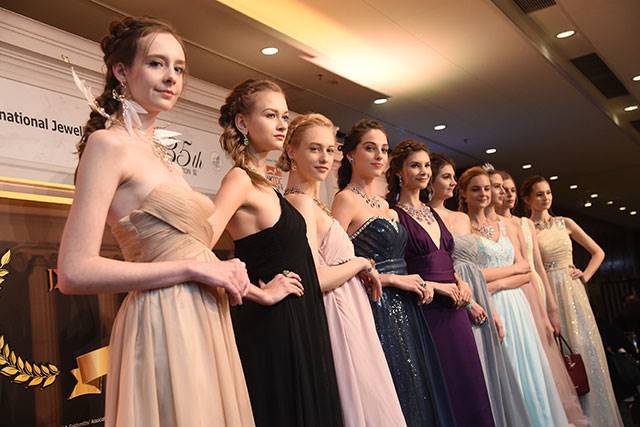
Above: Jewellery show for the Opening Night Gala Dinner
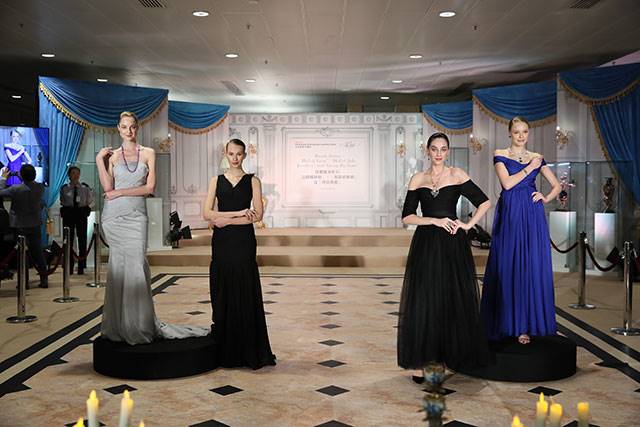
Above: Jewellery show for the Opening Night Gala Dinner
RESPONSIBLE BUSINESS PRACTICE IN THE FUTURE OF THE JEWELLERY INDUSTRY
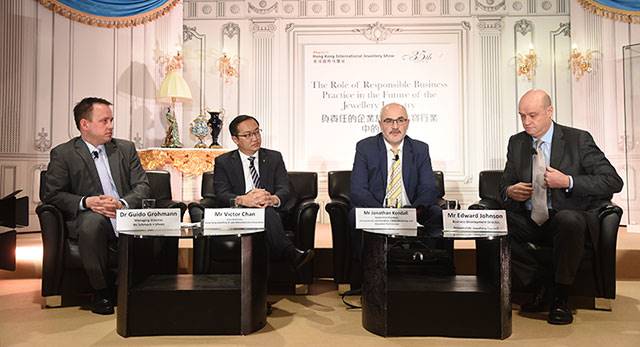
Above: RJC Panel discussion on The Role of Responsible Business Practice in the Future of Jewellery Industry
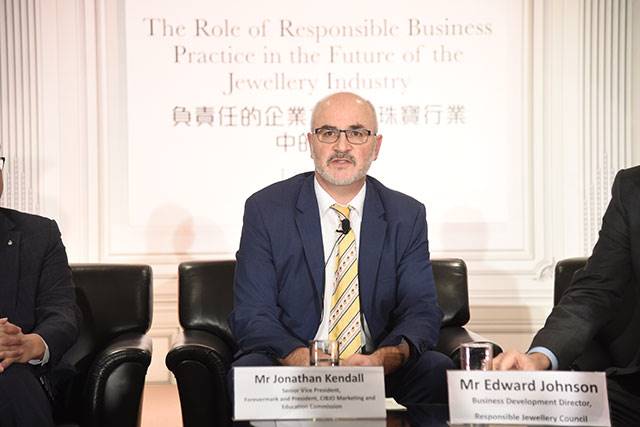 | 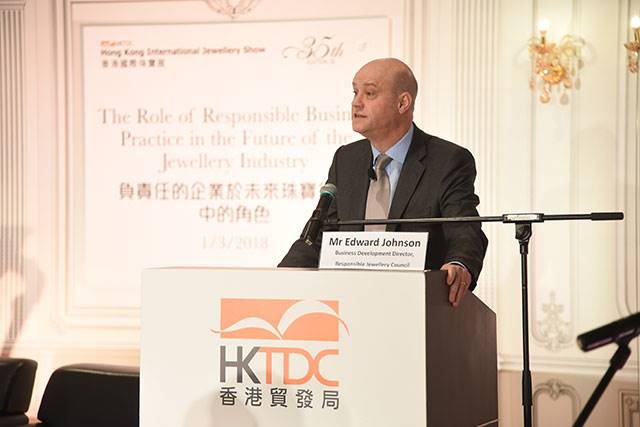 |
Above: Jonathan Kendall, vice president of Forevermark | Above: Edward Johnson, director of business development |
Busy Fairgrounds
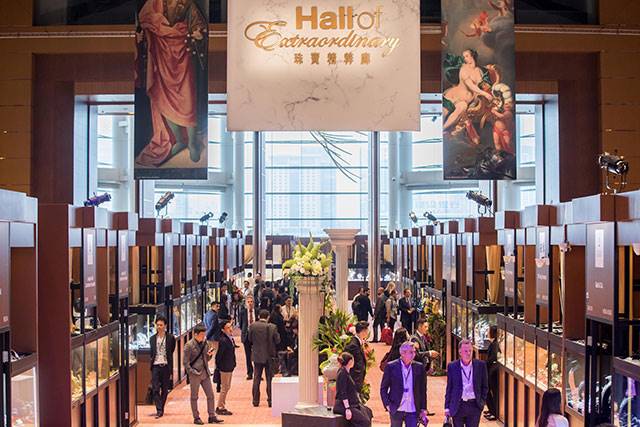
Above: Hall of Extraordinary entrance at the Jewellery Show.
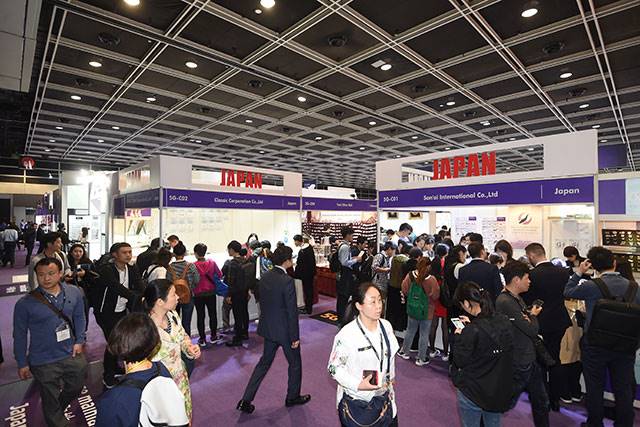
Above: New to the IDGPS show this year was the Japanese Pearl Auction.
GIA Seminar: New Diamond Findings & Developments
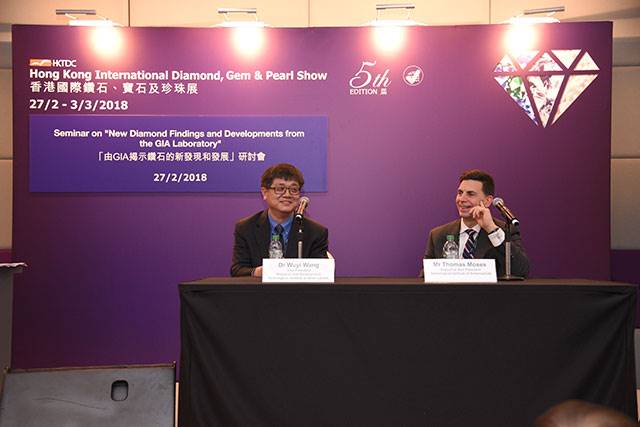
Above: Thomas Moses, GIA's executive vice president chats with Dr Wuyi Wang GIA's vice president of research and development at a seminar on New Diamond Findings and Developments from the GIA Laboratory
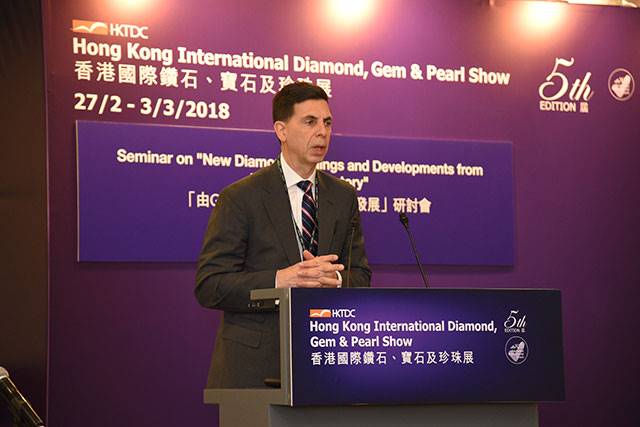
Above: Thomas Moses, GIA's executive vice president discusses updates on the GIA's diamond research.
IT Solutions for Jewellery & Disruption Seminar
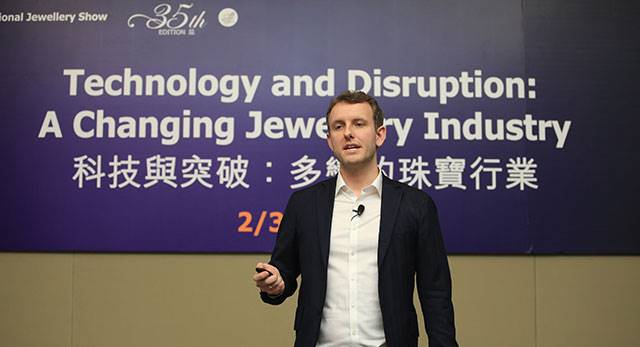
Above: Dominic Hill, founder of Atelier Technology speaking at the Technology and Disruption Seminar.
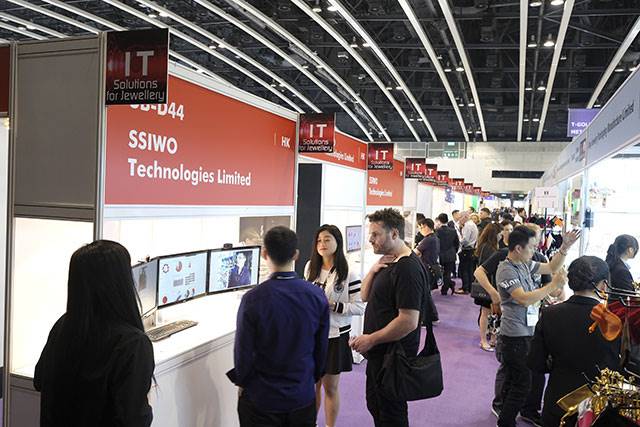 | 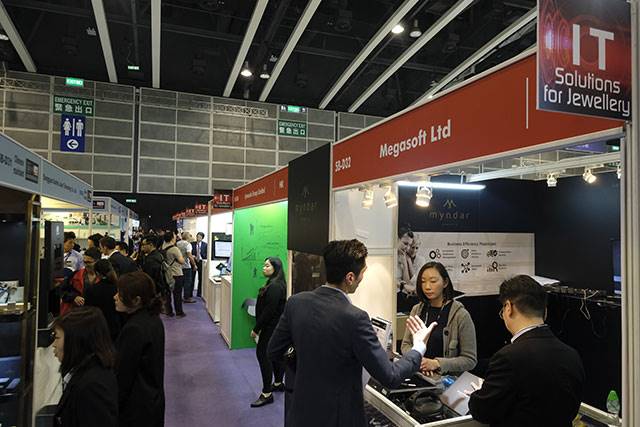 |
Above: IT Section | Above: IT Section |